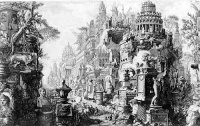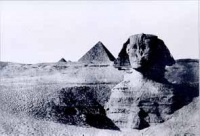Civilization
From The Art and Popular Culture Encyclopedia
| Revision as of 15:55, 11 January 2014 Jahsonic (Talk | contribs) ← Previous diff |
Current revision Jahsonic (Talk | contribs) |
||
| Line 1: | Line 1: | ||
| {| class="toccolours" style="float: left; margin-left: 1em; margin-right: 2em; font-size: 85%; background:#c6dbf7; color:black; width:30em; max-width: 40%;" cellspacing="5" | {| class="toccolours" style="float: left; margin-left: 1em; margin-right: 2em; font-size: 85%; background:#c6dbf7; color:black; width:30em; max-width: 40%;" cellspacing="5" | ||
| - | | style="text-align: left;" |The history of civilization is the history of a long [[war]]fare between the [[danger]]ous and powerful forces of the [[id]], and the various systems of [[taboo]]s and [[Sexual inhibition|inhibition]]s which man has erected to control them. --''[[Sex in History]]'' (1964) -- [[Gordon Rattray Taylor]] | + | | style="text-align: left;" | |
| + | "The history of [[civilization]] is the history of a long [[war]]fare between the [[danger]]ous and powerful forces of the [[id]], and the various systems of [[taboo]]s and [[Sexual inhibition|inhibition]]s which man has erected to control them." --''[[Sex in History]]'' (1964) by Gordon Rattray Taylor | ||
| + | <hr> | ||
| + | "We do not know whether the [[humanities|study of the humanities]], of the noblest that has been said and thought, can do very much to [[humanize]]. We do not know; and surely there is something rather terrible in our doubt whether the study and delight a man finds in [[William Shakespeare |Shakespeare]] make him any less capable of organizing a [[Nazi concentration camps|concentration camp]]." --"[[To Civilize Our Gentlemen]]" (1965) by George Steiner | ||
| + | <hr> | ||
| + | "[There has been no] carry-over from [[civilization]] to [[civility]], from [[humanism]] to the [[humane]]."-- ''[[In Bluebeard's Castle]]'' (1971), p. 79 by George Steiner | ||
| + | <hr> | ||
| + | "The causes, emergence, rise, interactions, achievements, [[decline]], and fall of [[civilization]]s have been explored at length by distinguished historians, sociologists, and anthropologists including, among others, [[Max Weber]], [[Emile Durkheim]], [[Oswald Spengler]], [[Pitirim Sorokin]], [[Arnold Toynbee]], [[Alfred Weber]], [[A. L. Kroeber]], [[Philip Bagby]], [[Carroll Quigley]], [[Rushton Coulborn]], [[Christopher Dawson]], [[S. N. Eisenstadt]], [[Fernand Braudel]], [[William H. McNeill]], [[Adda Bozeman]], [[Immanuel Wallerstein]], and [[Felipe Fernández-Armesto]]." --''[[Clash of Civilizations]]'' (1996) by Samuel P. Huntington | ||
| + | <hr> | ||
| + | "But and it is this that started the whole process and makes it possible nothing of the achieved conquests of human development is ever lost. Time does not devour its children. [[Civilization]]s, not civilization, are destroyed. That which is unadapted perishes, that which is adapted is preserved. Trample out [[Minoan culture]], it shoots up again in thousandfold splendour in the glory of Greece; crush out Greece, the whole world is fertilized; give the Roman world up to the fury of barbarian hordes, and the outcome is Modern Europe." --''[[The Making of Humanity]]'' (1919), Robert Briffault | ||
| |} | |} | ||
| [[Image:Western face of the Greek Parthenon.jpg|thumb|right|200px| | [[Image:Western face of the Greek Parthenon.jpg|thumb|right|200px| | ||
| Line 10: | Line 19: | ||
| <br>Illustration: ''[[Antichita Romanae]]'' ([[1748]]) by [[Giovanni Battista Piranesi|Piranesi]]]] | <br>Illustration: ''[[Antichita Romanae]]'' ([[1748]]) by [[Giovanni Battista Piranesi|Piranesi]]]] | ||
| - | [[Image:The Sphinx by Maxime Du Camp, 1849.jpg|thumb|right|200px|The [[Great Sphinx]] by [[Maxime Du Camp]], [[1849]], taken when he traveled in [[Egypt]] with [[Gustave Flaubert]].]]{{Template}} | + | [[Image:The Sphinx by Maxime Du Camp, 1849.jpg|thumb|right|200px|The [[Great Sphinx]] by [[Maxime Du Camp]], [[1849]], taken when he traveled in [[Egypt]] with [[Gustave Flaubert]].]] |
| - | + | {{Template}} | |
| '''Civilization''' or '''civilisation''' is a kind of [[human]] [[society]] or [[culture]]; specifically, a civilization is usually understood to be a [[complex society]] characterized by the process of [[state]] formation, the practice of [[agriculture]] and settlement in [[city|cities]]. Compared with less complex cultures, members of a civilization are organized into a diverse [[division of labour]] and an intricate [[social hierarchy]]. The term ''civilization'' is often used as a synonym for ''culture'' in both popular and academic circles. | '''Civilization''' or '''civilisation''' is a kind of [[human]] [[society]] or [[culture]]; specifically, a civilization is usually understood to be a [[complex society]] characterized by the process of [[state]] formation, the practice of [[agriculture]] and settlement in [[city|cities]]. Compared with less complex cultures, members of a civilization are organized into a diverse [[division of labour]] and an intricate [[social hierarchy]]. The term ''civilization'' is often used as a synonym for ''culture'' in both popular and academic circles. | ||
| Line 114: | Line 123: | ||
| * [[Civilized core]] | * [[Civilized core]] | ||
| * [[Civilisation (TV series)|''Civilisation'' (TV series)]], a documentary series by Kenneth Clark outlining the history of Western society | * [[Civilisation (TV series)|''Civilisation'' (TV series)]], a documentary series by Kenneth Clark outlining the history of Western society | ||
| + | * ''[[Civilization and Its Discontents]]'', 1930, Freud | ||
| + | * [[Clash of civilizations]] | ||
| * [[Cradle of civilization]] | * [[Cradle of civilization]] | ||
| * [[Culture]] | * [[Culture]] | ||
Current revision
|
"The history of civilization is the history of a long warfare between the dangerous and powerful forces of the id, and the various systems of taboos and inhibitions which man has erected to control them." --Sex in History (1964) by Gordon Rattray Taylor "We do not know whether the study of the humanities, of the noblest that has been said and thought, can do very much to humanize. We do not know; and surely there is something rather terrible in our doubt whether the study and delight a man finds in Shakespeare make him any less capable of organizing a concentration camp." --"To Civilize Our Gentlemen" (1965) by George Steiner "[There has been no] carry-over from civilization to civility, from humanism to the humane."-- In Bluebeard's Castle (1971), p. 79 by George Steiner "The causes, emergence, rise, interactions, achievements, decline, and fall of civilizations have been explored at length by distinguished historians, sociologists, and anthropologists including, among others, Max Weber, Emile Durkheim, Oswald Spengler, Pitirim Sorokin, Arnold Toynbee, Alfred Weber, A. L. Kroeber, Philip Bagby, Carroll Quigley, Rushton Coulborn, Christopher Dawson, S. N. Eisenstadt, Fernand Braudel, William H. McNeill, Adda Bozeman, Immanuel Wallerstein, and Felipe Fernández-Armesto." --Clash of Civilizations (1996) by Samuel P. Huntington "But and it is this that started the whole process and makes it possible nothing of the achieved conquests of human development is ever lost. Time does not devour its children. Civilizations, not civilization, are destroyed. That which is unadapted perishes, that which is adapted is preserved. Trample out Minoan culture, it shoots up again in thousandfold splendour in the glory of Greece; crush out Greece, the whole world is fertilized; give the Roman world up to the fury of barbarian hordes, and the outcome is Modern Europe." --The Making of Humanity (1919), Robert Briffault |

Illustration: Antichita Romanae (1748) by Piranesi
|
Related e |
|
Featured: |
Civilization or civilisation is a kind of human society or culture; specifically, a civilization is usually understood to be a complex society characterized by the process of state formation, the practice of agriculture and settlement in cities. Compared with less complex cultures, members of a civilization are organized into a diverse division of labour and an intricate social hierarchy. The term civilization is often used as a synonym for culture in both popular and academic circles.
Contents |
History
Early civilizations
Antiquity (Axial Age)
Karl Jaspers, the German historical philosopher, proposed that the ancient civilizations were affected greatly by an Axial Age in the period between 800 BC-200 BC during which a series of male sages, prophets, religious reformers and philosophers, from China, India, Iran, Israel and Greece, changed the direction of civilizations forever. William H. McNeill proposed that this period of history was one in which culture contact between previously separate civilizations saw the "closure of the oecumene", and led to accelerated social change from China to the Mediterranean, associated with the spread of coinage, larger empires and new religions. This view has recently been championed by Christopher Chase-Dunn and other world systems theorists.
- Mediterranean civilizations of the Classical Period
- Middle East
- Persia since the Achaemenids
- Second Temple Judaism
- Ancient India (Maurya Empire, Gupta Empire)
- Ancient China (Qin Dynasty, Han Dynasty)
- Ancient Nomads (Hun Xiongnu, Kok Turk Empire)
Medieval to Early Modern
- Christendom
- Islamic World
- Asia
- South East Asia
- Funan, Chenla, Champa, Anghor Cambodia
- Dvaravati, Hariphunchai, Sukhothai, Ayutthaya Kingdom, pre Modern Thailand
- Pagan Burma
- Chola, Pallava, Sri Vijaya, Sailendra, Mataram and Majapahit
- Meso-American civilizations
- African civilizations
Contemporary
See also
- Anarcho-primitivism
- Barbarian
- Civilized core
- Civilisation (TV series), a documentary series by Kenneth Clark outlining the history of Western society
- Civilization and Its Discontents, 1930, Freud
- Clash of civilizations
- Cradle of civilization
- Culture
- History of the world
- Human population
- Kardashev scale
- Mission civilisatrice
- Muslim world
- Proto-civilization
- Western civilization
- State of nature



